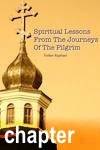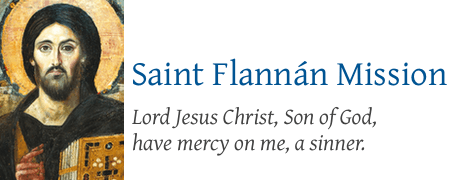 Life is a journey, not just a destination. Do we actively look out for God’s subtle signs along our way as His mercies?
Life is a journey, not just a destination. Do we actively look out for God’s subtle signs along our way as His mercies?
Dear beloved,
Our pilgrim recounted to us, his relationship with his spiritual father, whom he communicated with regularly, yet another respected spiritual elder in the pilgrim’s life (besides the reposed starets who often appeared to him in dreams).
Often, in our lives, we may lead a sacramental life as faithful Christians, praying at home, reading the Holy Bible and other writings, and attending Church services. However, as we have seen in this book, the pilgrim mentioned many times, the need for a spiritual father in our journey towards God. The spiritual father becomes an available teacher to us, to guide us, to check on our progress, and to help us resist the works of the evil one and his many guises. Often, when people go on their own, it becomes difficult to discern the many subtle Divine signposts intended to guide us, or get easily distracted by the many seemingly pleasant temptations of the devil. While all of us can profess we will resist the devil’s works, we are but mere mortals and grave sinners, and our pride and naiveté gets in the way. Therefore, a spiritual father and confessor can be someone we turn to for a prayerful life, as a form of check and balance, as a form of discerning a progressing journey. I have realized that, as the pilgrim did, that it is not easy to find such a spiritual father. But God intends that we take our pilgrimage in life towards Him, seriously (1 Timothy, Titus 1:6-9).
The elder asked about the pilgrim’s life, before the pilgrim was to depart from Irkutsk.
The pilgrim then began to reveal his life. He was born in an Orlovsk village. His parents died when he was two years old while his elder brother was ten. His grandparents, an inn owner, cared for them. The pilgrim’s elder brother became a wayward drunkard, and caused the pilgrim’s left arm to become disabled when the pilgrim was seven years old. Since the pilgrim could not work physical labors anymore, his grandfather taught him to read and write, through the Holy Bible. Eventually, the pilgrim’s grandfather was going blind, and it became the pilgrim’s turn to read the Bible to his grandfather. The pilgrim also learned from a county clerk, who had beautiful handwriting. The pilgrim’s grandfather told him to be thankful to God, and pray often. Often, the pilgrim would pray, “Have mercy on me, O God”. When the pilgrim turned seventeen, his grandmother died. His grandfather insisted that the pilgrim get married, since there was no longer a mistress in the house to tend to family chores. Even though the heart of the pilgrim was against it, his grandfather found him a mature and kind twenty years old lady for him, and they were married.
When the pilgrim was eighteen, sadly, his grandfather died, leaving him the entire inn. His last words were to be a faithful Christian, pray often, attend Church, read the Holy Bible, pray often for his reposed family members, and be kind to the poor.
In life, we are faced with many choices. Sometimes, none of the obvious choices seem to be what we desire or want. However, the consolation I have experienced is that, once we surrender our personal will to God, let go of our egos, vainglory, pretensions, and imagine ourselves, as Adam first was to God, naked, then God will in His mercy, hold us and lead us back to Him. The pilgrim did not want to be married, but God’s will was that he should be at that point in time, to have a consolation in his life, to care for him. If he did not surrender to the Divine will at that point and insisted on not getting married, his life would have gotten worse (Jeremiah 29:11, Proverbs 3 and 15).
However, the wayward elder brother was jealous that their grandfather gave everything to the pilgrim, so his envy raged so much that he burned the inn down and stole everything. The pilgrim and his wife were mercifully spared from the fire, and escaped with their Holy Bible, the very same one his grandfather read to him from. The pilgrim and his wife escaped with only the pajamas on them. They managed to build a small cabin with the help of others, and his wife started to work to support the family, with weaving and sewing. His wife was a pious Christian, and would often be moved to tears as the pilgrim read to her passages in the Holy Bible. Even though they were poor, they kept to their reposed grandfather’s advice, to be faithful and prayerful.
What happens when your most trusted people turn against you? Is it not a spiritual struggle of great magnitude? We see in today’s highly connected world of social media, quick tempers and transient relationships. “Friendships” seem quick to happen, and yet can disappear like the mist just as quickly. Because of the stressful world we are entrenched in, greed, envy, anger, hatred, and many sins, rise to the surface, brewing like a potent poison, infecting many in the same pot of the world. It is so easy to fall prey to the evil one’s temptations and simply allow our fallen selves to take over, and to join in the same path of destruction, hatred, anger, envy, and greed (Romans 1:29, Titus 3:3).
But God intends that we fight against these temptations, to return to the inner cabinet, pray to Him, and surrender our own will of madness. Even if families were to turn against us, the pilgrim and his wife showed us, what pious true Christians should be, without hatred, without anger, only prayer, only charity, only love. High expectations from God no less, but God did not intend us to have a wide and easy path, but a narrow gate (St Matthew 7:13).
The pilgrim was again challenged, when his wife fell ill when he was twenty years old, and died. The pilgrim was then truly alone, and unable to support himself. He took only his most precious possession, his grandfather’s Holy Bible, a backpack, and a disability passport (a necessary travel document in those days), and decided to go to Kiev to venerate the relics of saints to ask for intercession. That was thirteen years ago.
The pilgrim’s spiritual father exclaimed that the pilgrim, was thirty-three, the age of our Lord Jesus Christ when he was crucified. There are no coincidences in life (Jeremiah 1:4-5).
We are spiritual soldiers, much as Saint Paul the Apostle said. We are to run a marathon of life, to our last breath. We are never to give up on our faith in God, never to give up the pristine heart of Christ we feebly try to imitate, never to fall prey to the many temptations of the evil one (1 Chronicles 28:20, 1 Corinthians 16:13, 2 Timothy 4). We are to fight this inner struggle within our frail bodies and spirits, and to keep vigil, and to pray like Saint Seraphim of Sarov was often depicted, fallen to the ground, with eyes skyward to God, aware of our fallen state, and yet hoping and longing to God, and pray:
“Lord Jesus Christ, Son of God, have mercy on me, a sinner.”
